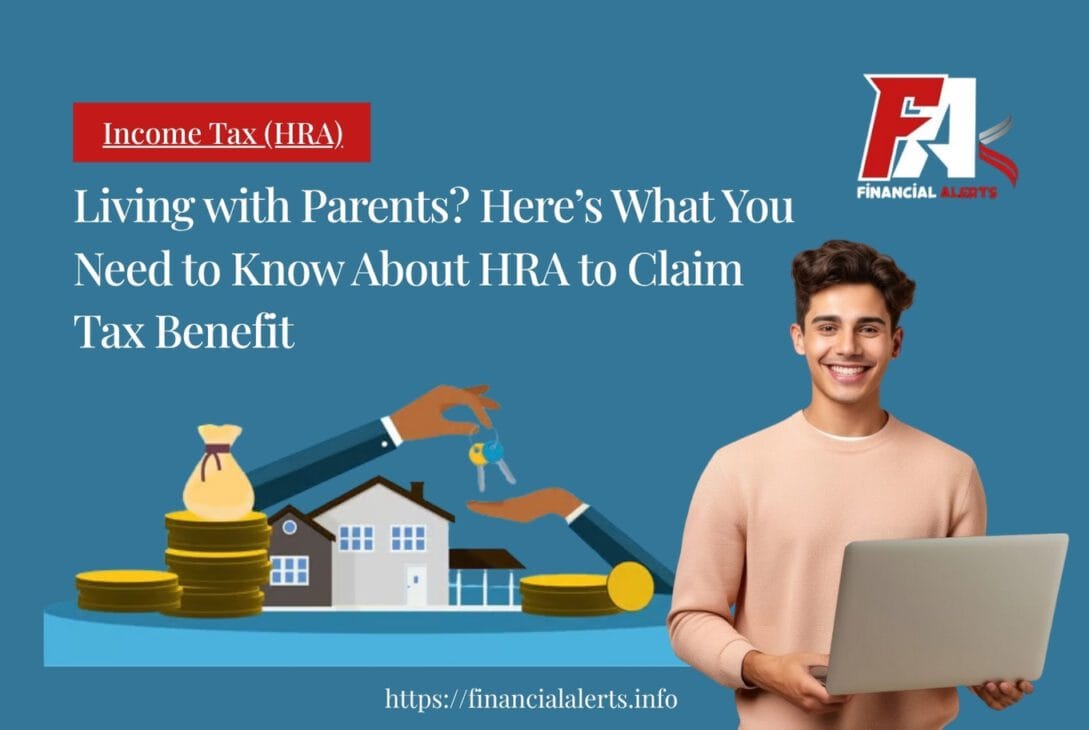Living with your parents is a great way to save money, stay close to family, and enjoy the comfort of home. But did you know you can also save tax on your income tax by claiming House Rent Allowance (HRA)? If you’re a salaried employee in India, you may receive HRA as part of your salary income, and even if you live with your parents, you can use it to reduce your taxes. This blog explains HRA in simple English, covering how to claim your tax benefits, the income tax rules for HRA, and how to ensure compliance with the Income Tax Act. Let’s dive into how you can claim my tax benefits legally while living at home.
What is HRA?
HRA stands for House Rent Allowance, a component of your salary income provided by your employer to help cover rent expenses. Under Section 10(13A) of the Income Tax Act 1961, you can claim a tax exemption on this allowance, reducing your taxable income and helping you pay less tax. The best part? You can claim HRA even if you live with your parents, provided you pay them rent and follow the income tax rules. This is a smart way to save your tax while enjoying the benefits of living at home.
Can You Claim HRA While Living with Parents?
Yes, you can claim HRA if you live with your parents, as long as you genuinely pay rent to them. The Income Tax Department allows this under specific conditions for claiming HRA, making it a great option for salaried individuals to lower their my taxes while staying with family. Here’s the key: your parents must own the house (or part of it), and you need a proper rent agreement to support your HRA claim for parents’ house. The rent you pay becomes part of your parents’ rental income, which they must report in their income tax return. By following the tax law, you can legally claim tax deductions and reduce your taxable income.
How to Claim HRA When Living with Parents
To claim your tax return benefits through HRA while living with your parents, follow these steps to ensure compliance with the Income Tax Act:
- Create a Rent Agreement: Draft a rent agreement for income tax exemption with your parents. This document should detail the rent amount, payment frequency, and duration. While notarizing the agreement is optional, it adds credibility to your HRA claim in income tax.
- Pay Rent and Keep Proof: Pay rent to your parents via bank transfer or cheque to maintain a clear record. Avoid cash payments, as they may not be accepted as proof by the income tax company. Request rent receipts that include the rent amount, date, house address, and your parents’ signature to support your HRA income tax deduction.
- Provide Parents’ PAN: If your annual rent exceeds ₹1 lakh, submit your parents’ Permanent Account Number (PAN) to your employer. This ensures transparency with the income tax department and supports your individual tax return.
- Ensure House Ownership: The house must be in your parents’ name (or one parent’s name) to qualify for HRA deduction under Section 10. If you or someone else owns the property, you cannot claim house on taxes under HRA rules.
- Parents Report Rental Income: The rent you pay is considered your parents’ rental income and must be reported in their income tax return for rental income as either “Income from House Property” or “Income from Other Sources.” If their taxable income is below the income tax exemption limit, they may not owe tax on house rent income, but reporting is mandatory.
By following these steps, you can claim tax exemption on HRA and reduce your income tax legally.
How Much HRA Can You Claim?
The tax exemption for HRA depends on the lowest of these three amounts, as per the income tax rules for HRA exemption:
- HRA You Receive: The actual HRA amount included in your salary income by your employer.
- Rent Paid Minus 10% of Salary: Subtract 10% of your basic salary (plus dearness allowance, if applicable) from the rent you pay your parents.
- City-Based Limit: For metro cities like Delhi, Mumbai, Kolkata, or Chennai, you can claim up to 50% of your basic salary. For HRA for non-metro cities, the limit is 40%.
Example: Suppose your basic salary is ₹20,000 per month, your HRA is ₹10,000, and you pay ₹8,000 rent to your parents in a metro city. Here’s how to calculate HRA for income tax:
- HRA Received: ₹10,000
- Rent Paid Minus 10% of Salary: ₹8,000 – (10% of ₹20,000) = ₹8,000 – ₹2,000 = ₹6,000
- 50% of Basic Salary: 50% of ₹20,000 = ₹10,000
The smallest amount is ₹6,000, so you can claim ₹6,000 per month as a tax exemption on HRA, reducing your taxable salary.
Use an income tax calculator with HRA or consult an income tax company to accurately calculate your income tax and verify your HRA calculation as per income tax.
Things to Be Careful About
While claiming HRA for rent paid to parents is legal, the Income Tax Department scrutinizes such claims to prevent misuse. Here are tips to stay compliant with tax laws:
- Be Honest: Don’t fake rent payments to claim income tax. The tax department may request bank statements or rent receipts to verify your rent claim.
- Pay Fair Rent: The rent should align with market rates in your area. Exaggerated rent amounts to maximize tax rebates may raise red flags.
- Live in the House: You can only claim HRA for the house you reside in. Claiming HRA for another property owned by your parents is not allowed.
- Check Parents’ Taxes: Ensure your parents report the rental income in their parents’ income tax return. If their taxable income exceeds the minimum income to pay income tax, they may need to pay tax on rental income. Plan with them to avoid unexpected tax payments.
Consult a tax expert or use an income tax calculator for rental income to ensure compliance with income tax provisions.
Why Claim HRA When Living with Parents?
Claiming HRA while living with your parents offers multiple benefits:
- Save on Taxes: By claiming HRA income tax exemption, you reduce your taxable income, allowing you to save tax and keep more of your salary income.
- Support Your Parents: The rent you pay can provide financial support to your parents, especially if their income tax minimum income is low, potentially qualifying them for tax rebates for parents.
- Cost-Effective Living: Living with parents is often cheaper than renting elsewhere, and combining it with HRA tax deductions maximizes your savings.
Conclusion
Claiming HRA under income tax while living with your parents is a smart way to save your tax and support your family. By paying rent through a rent agreement for HRA, maintaining proof like rent receipts, and ensuring your parents report the rental income in their income tax return, you can legally claim tax deductions. This reduces your income tax while providing financial benefits to your parents.
If you’re unsure about the process or need help with HRA calculation for salary, consult a tax expert or use an income tax calculator to navigate the income tax rules for house rent rebate. Living with your parents doesn’t mean missing out on tax benefits. With the right steps, you can claim your tax return, enjoy family time, and make the most of HRA exemption under income tax.
For more details on income tax registration, tax return for salaried individuals, or HRA conditions in income tax, visit the official income tax website or seek professional advice from an income tax company. Stay compliant with the Income Tax Act 1961, and start saving on your taxes today!

I am a digital marketing executive as well as content writer in the income tax and credit cards category. My goal is to provide simple, interesting and reliable information to readers through my articles so that they always stay updated with the world of income tax and credit cards.



